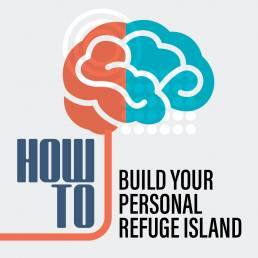



Note to readers: Healing Space is a weekly series that helps you dive into your mental health and take charge of your wellbeing through practical DIY self-care methods.
Refuge islands are naturally occurring highlands that allow animals caught in a flood to find a space to shelter. In the recent Western Australian floods, displaced cattle have gathered on these islands. In Kaziranga National Park, Assam, where more than 75 percent of the park gets routinely inundated, the Assam Forest Department two decades ago began to build 144 islands. These islands are what have offered safe harbour to the rhinos, wild buffalo and other native species. In a crisis, animals instinctively seek out higher ground and remain there until it is safe. We need to do the same; both build and seek our higher ground.
 Two years of the pandemic have seen a layered crisis unfold. Apart from the SARS-CoV-2 Covid-19 contagion itself, we have seen the break down of mental health, a rise in domestic violence, abuse, child marriages, suicide rates, and a decreased access to non pandemic-related health services, education, and public utilities from parks to transport.
Two years of the pandemic have seen a layered crisis unfold. Apart from the SARS-CoV-2 Covid-19 contagion itself, we have seen the break down of mental health, a rise in domestic violence, abuse, child marriages, suicide rates, and a decreased access to non pandemic-related health services, education, and public utilities from parks to transport.
Not yet out of the pandemic, and we are greeted with the Ukraine-Russia war, our students stuck there, and a surge in oil prices that affects inflation and the stability of the global economy. Clearly, we have witnessed beyond a doubt that no crisis is regional. As the world becomes more technologically interconnected, we are impacted by each other in ways we cannot fathom.
The vaccine alone is not enough to end the pandemic. We need boosters, and collective behaviours. We may have to learn to manage the pandemic rather than wait for it end. Research tells us that we can expect more variants or other rampaging illnesses to emerge.
A lot of the anger that has arisen is because of the collapse of structures we once took for granted. We believed the World Health Organization (WHO) would coordinate a pandemic fairly. But we see African nations blocked from vaccines by the EU and no interventions. We believed governments would step up the distribution of medicines and supplies. But we have seen systems fail us and instead, citizens rally. ‘Mandates’ have been proven futile. Zero tolerance countries like New Zealand and Hong Kong today have the highest death rates. So, who do we believe in? What do we repose our trust in?
The mental health crisis emerges from the debris of structural integrity in the world. Uncertainty, anxiety, loss of purpose, faith, the ability to see a way out, or something to believe in. We are learning the value of mental health today because we see that when we cannot control the external, we have to be able to rely on and keep stable, the internal Locus of Control.
Our solutions can no longer be blanket and fixed. We have seen western countries count the impact of the pandemic differently from developing countries; suicide rates in the US have fallen while ours have risen. However, our family structures have protected us in ways theirs haven’t; in sleep patterns, speech milestones for children’s development, and shared resources to offset job loss. With it comes the recognition that we each can only use what works for us, within the realm of our possibility. We must fragment into localised solutions.
School closures impact our children developmentally, but we cannot insist on ‘going back to normal’ because we know the pandemic impacts them too and they are unvaccinated.
Also read: Healing Space | Our children are struggling
Instead of forcing a return to the past, we have to discard our reluctance to accept changes, and find a hybrid model. At this time, it is more important to deal with reality than an expected ideal.
If the pandemic will come and go, we need to be able to shift school terms from their fixed positions to floating terms, count them not from year to year, but from hours attended, or credits, that can be compensated at another time.
If all children don’t have access to technology, we have to make provisions for some who don’t to come to school and some who do, to study from home. If there is a lockdown mandate, we need to build in a social  component to online learning, which is a scheduled open air play meets on specific days. Curricula must move from didactic to suggestive. All institutions need to be able to shift from standardised models to building islands of refuge into the distorted landscape. From one ideal for everyone, to what works for each one.
component to online learning, which is a scheduled open air play meets on specific days. Curricula must move from didactic to suggestive. All institutions need to be able to shift from standardised models to building islands of refuge into the distorted landscape. From one ideal for everyone, to what works for each one.
The only other place where they use refuge islands are in road design. When you cross a very wide road, the divider or triangle you run towards in the middle, marked by either a raised platform, or triangle cones, or cordoned off, is the refuge island. That is where you know you will be safe from oncoming traffic. It makes the most difference to the vulnerable, the elderly and children, people who can’t run as the signal turns.
A refuge island does not seek to be an all-encompassing solution. It’s what works halfway. It’s what gets us through this crisis, for now. We may need masks and online learning now, but in-person and mask-free later. We can decentralise testing, self recovery, but also education, workplaces, and in releasing what we don’t need to control, we regain our internal Locus of Control. When we accept the situation, each other and ourselves, with our constraints, liabilities, we see that we no longer need a perfect answer.

Discover the latest Business News, Sensex, and Nifty updates. Obtain Personal Finance insights, tax queries, and expert opinions on Moneycontrol or download the Moneycontrol App to stay updated!
Find the best of Al News in one place, specially curated for you every weekend.
Stay on top of the latest tech trends and biggest startup news.